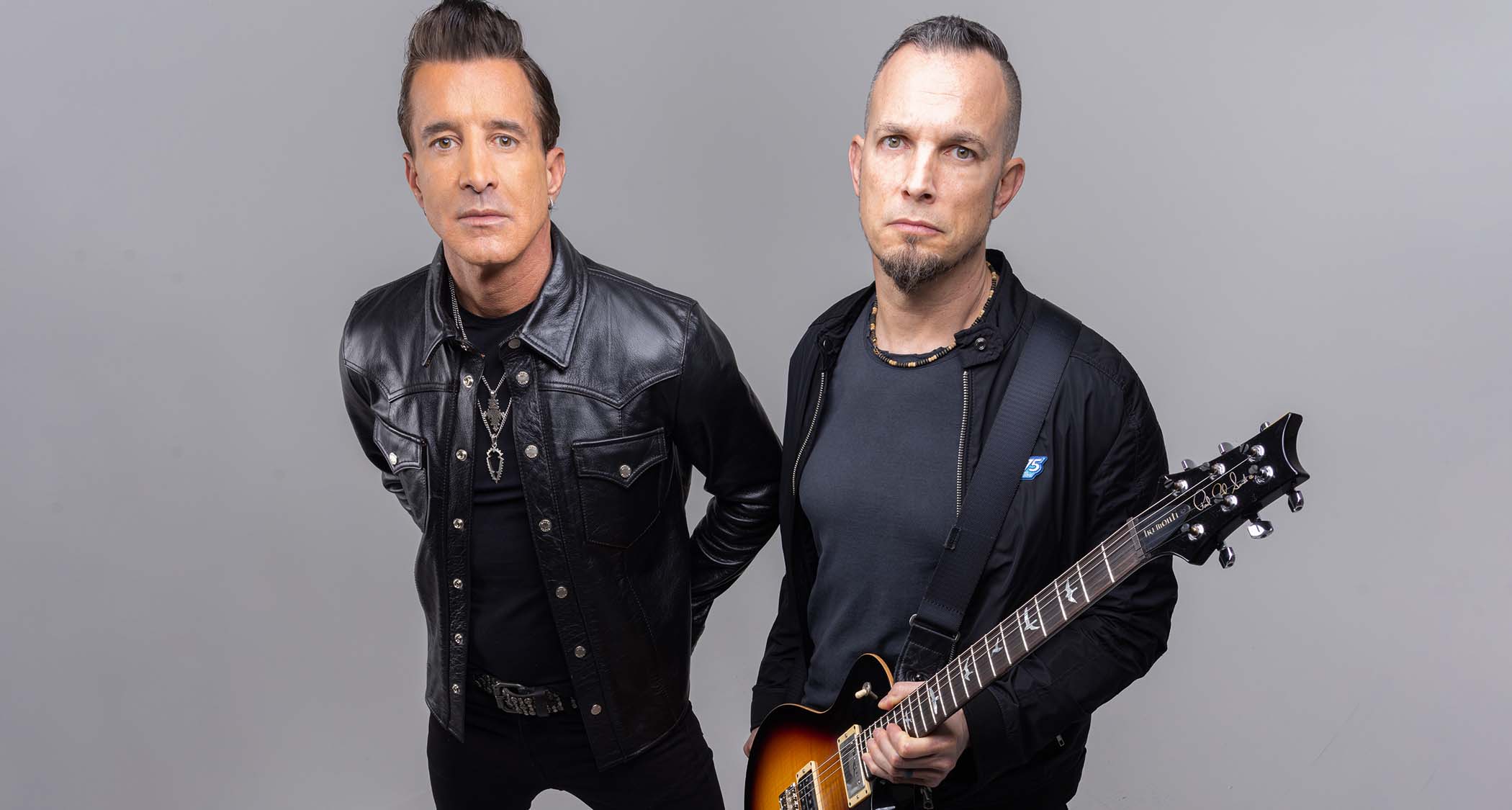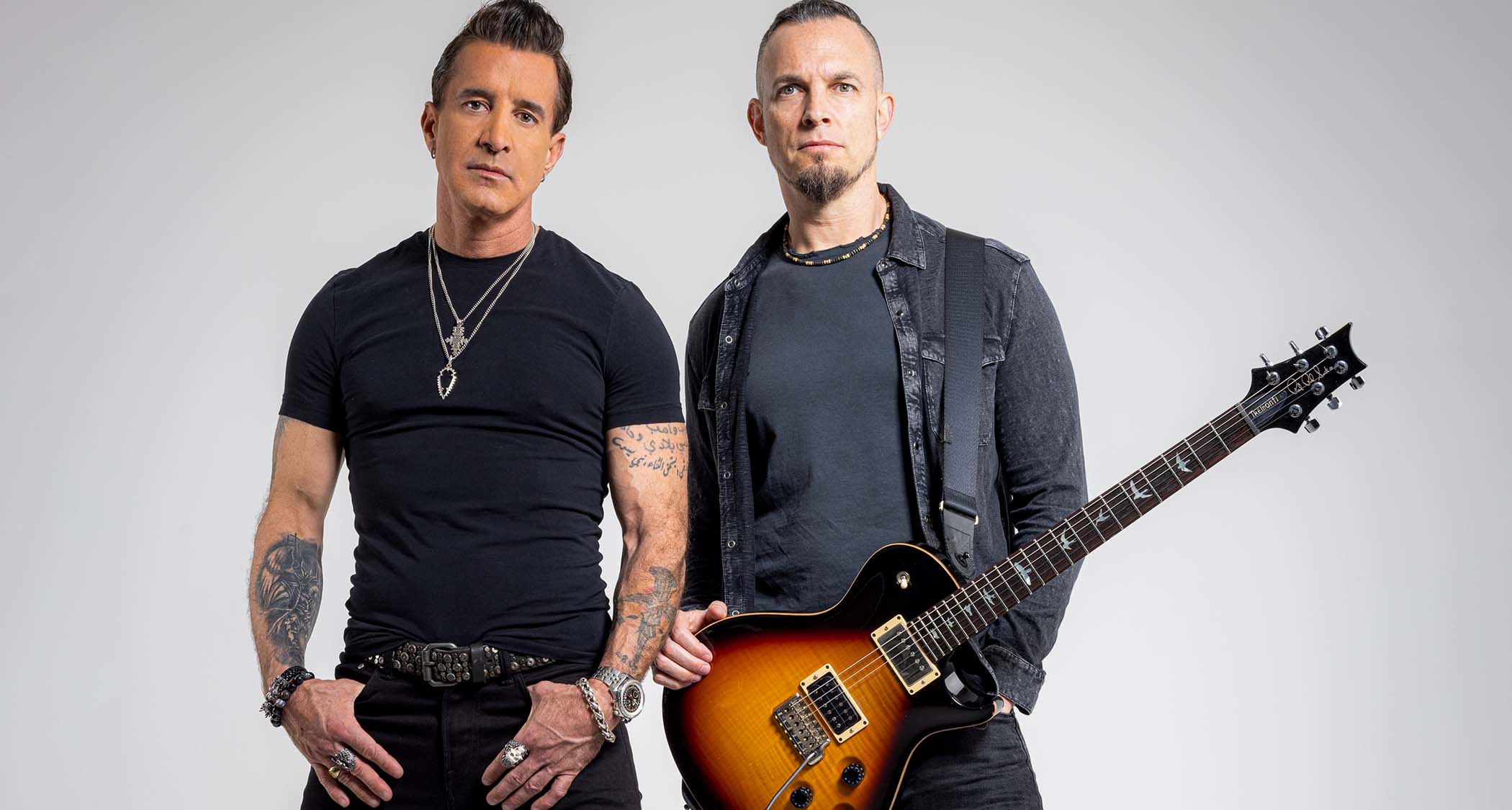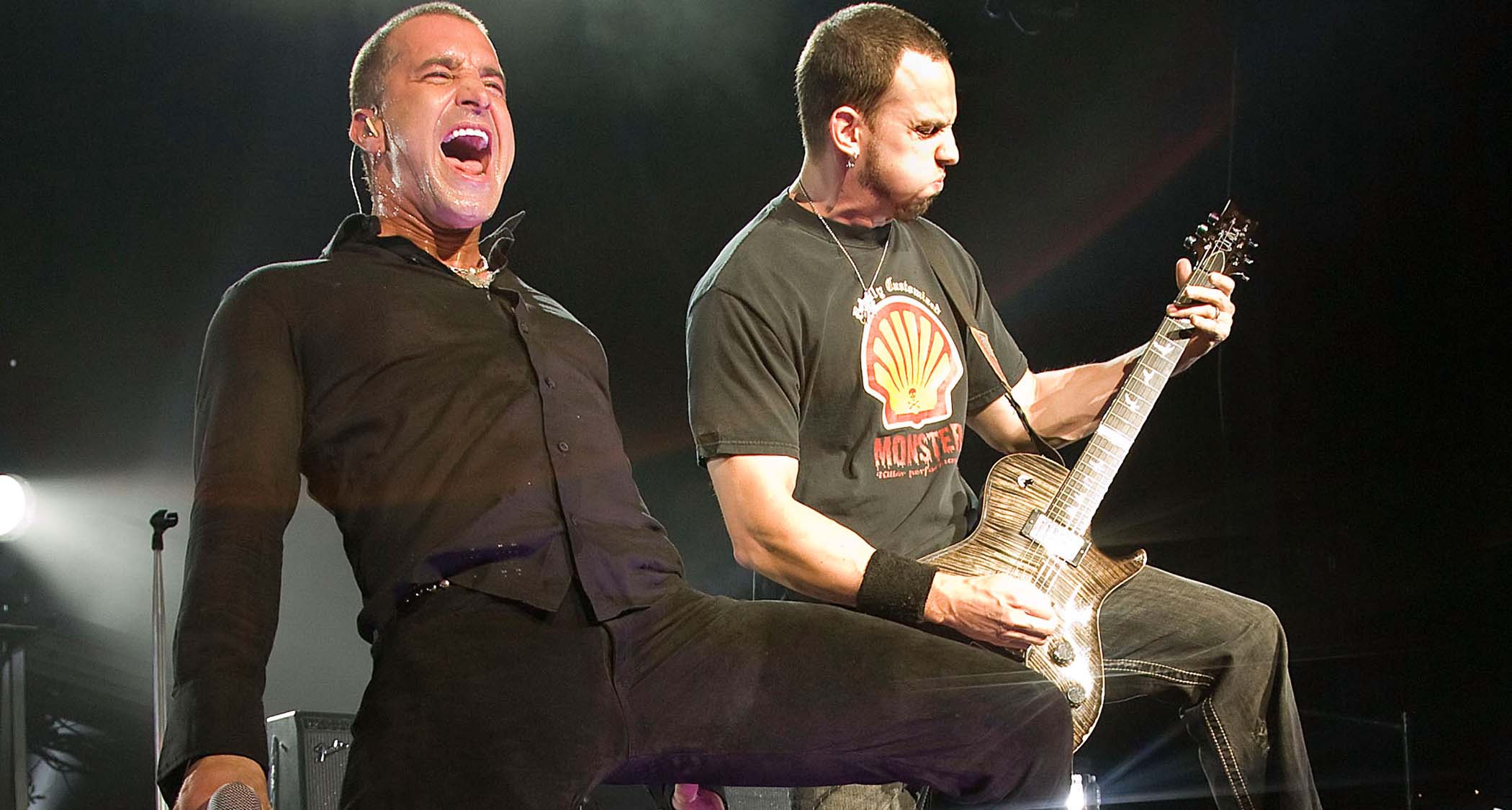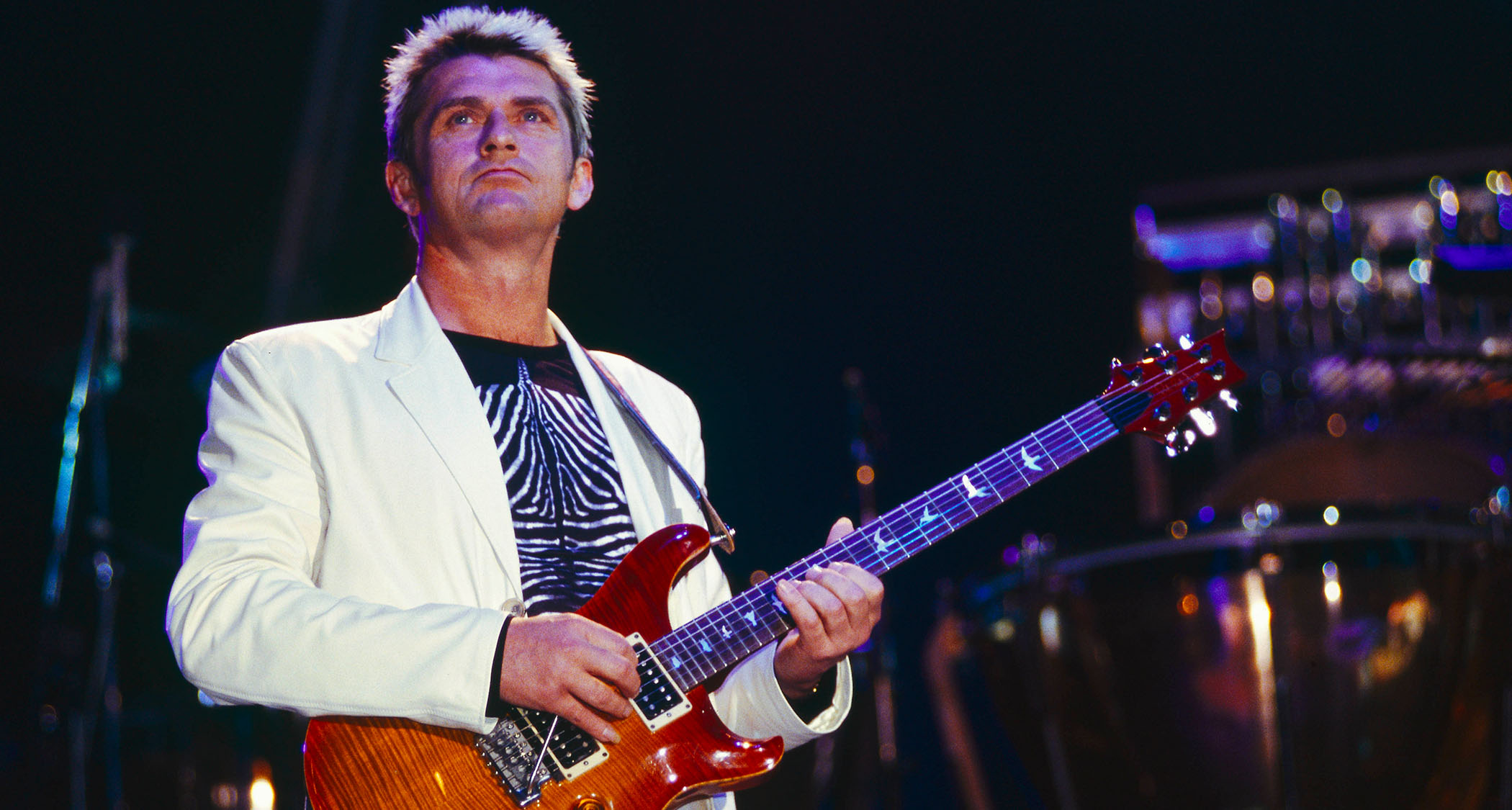“The first three records of our career, everybody was talking about how we were going to fail. Each next step was going to be a disaster”: Mark Tremonti and Scott Stapp on the unlikely rebirth of Creed – and why they’ve always been cool

All the latest guitar news, interviews, lessons, reviews, deals and more, direct to your inbox!
You are now subscribed
Your newsletter sign-up was successful
“We didn’t plan any of it,” Mark Tremonti says. “I don’t think anybody could have planned it. Everything just fell into place and happened organically. It’s pretty incredible.”
The guitarist is responding to the strange, unexpected and borderline paranormal phenomenon that swept the nation last fall when Creed – that’s right, Creed, perhaps one of the most polarizing bands of the past 30 years, mercilessly derided by critics as overly earnest Pearl Jam knockoffs but adored by millions of music fans – were publicly embraced by not one, but two professional sports franchises.
The Texas Rangers were the first to get the ball rolling. The baseball team were facing a midseason slump when they started psyching themselves up to Creed’s music in their locker room. Before long, the Rangers’ fortunes turned around and they began pumping Creed’s anthemic 1999 hit Higher during home games at Globe Life Field in Arlington, Texas, resulting in rapturous fan singalongs.
By the time the Rangers swept the Baltimore Orioles 3-0 in ALDS playoffs, Creed’s streams were up 175 percent on Spotify. Baseball’s Creedmania culminated with the Rangers winning their first-ever World Series against the Arizona Diamondbacks. Online videos captured the team celebrating in their locker room with a Champagne-soaked, full-throated rendition of Higher.
A similar scenario unfolded in the NFL world, when Minnesota Vikings quarterback and dedicated Creed fanboy Kirk Cousins used Higher as a locker room team motivator. One victory led to another and another, and as the team rode a five-game winning streak, they moved Creed’s music from the clubhouse to the stadium.
Vikings fans adopted Higher as their own rallying cry and sang along mightily as the track roared over the P.A. at U.S. Bank Stadium. During one game, in which the Vikings defeated the New Orleans Saints, the audio dropped out, but the crowd kept right on singing without missing one lyric.
Madison Avenue got in on the zeitgeist with a Super Bowl ad for Paramount Plus that featured Drew Barrymore, Patrick Stewart and other stars trapped on snow-covered Paramount Mountain. Various rescue methods are shot down by Stewart until he hears the opening chords to Higher and sees Tremonti and Creed singer Scott Stapp rocking out.
All the latest guitar news, interviews, lessons, reviews, deals and more, direct to your inbox!
What follows is even more surreal: An inspired Stewart (who reveals a Creed tattoo on his lower back) grabs the animated character Arnold (from Hey Arnold!) and tosses him like a football while crooning, “I just threw him hiiiiigher, to a place where we won’t freeze.” Watching it all, a vaguely dazed-looking Barrymore joins the chorus.
In the late Nineties and early 2000s, hating on Creed was something of a public pastime (remember those “Even Jesus Hates Creed” T-shirts?).
But the sweet serendipity of the events that gave rise to the band’s recent revival (fueled even further by young, meme-making TikTokkers, many of whom weren’t even born during the group’s heyday) has led to a stunning reversal of perception: Creed are cool. And not just some ironic form of nostalgia cool, but cool as in the genuine article.
I’ve always said that Creed was cool with the fans. The critics and the media painted this narrative that didn’t reflect 95 percent of the population
Scott Stapp
None of which surprises Stapp one bit. “I’ve always said that Creed was cool with the fans,” he says. “The critics and the media painted this narrative that didn’t reflect 95 percent of the population. You don’t sell millions of records and sell out multiple nights in arenas if you’re uncool. The media put this idea out there because we were so big, and it wasn’t the story they wanted moving forward. But it’s the people that matter, not the press.”
Tremonti draws a straight line between the backlash and the band’s massive popularity, noting, “Whether it’s LeBron James in basketball or Creed in rock ’n’ roll, anytime somebody is on top, people want to see them knocked down. We were on the radio non-stop, and we were playing your city every other month. Some people push back on that.
“You’re seeing it now with Taylor Swift. She shows up at a [Kansas City] Chiefs game, and everybody wants to hate on the situation. It’s just a shame. Don’t hate on people because they’re successful.”
On their own, Creed, who haven’t toured since 2012, began laying the groundwork for a comeback last summer when they announced a “Summer of ’99” cruise in which they would headline concerts featuring 3 Doors Down, Buckcherry and other acts.
I remember when Bon Jovi came back and blew up arenas, I thought, ‘I sure hope this happens with Creed’... Lo and behold, here we are doing exactly what I hoped would happen.
The cruise sold out in 30 minutes, and the band quickly put another nautical experience on sale. When it, too, sold out, it became clear that the demand for Creed called for a full-scale summer tour of sheds and amphitheaters, which was soon extended to a fall arena run.
“I remember when Bon Jovi came back and blew up arenas, I thought, ‘I sure hope this happens with Creed,’” Tremonti says. “People grow up and they want to relive their youth and see the bands they loved. Lo and behold, here we are doing exactly what I hoped would happen. We put the summer tour on sale, and it took off well beyond what we imagined. I spoke to my agent, and he said, ‘This is bigger than you guys were at your prime, ticket sales-wise.’ It’s unbelievable.”
Coming out of Tallahassee, Florida, Creed (which also includes bassist Brian Marshall and Scott Phillips) took the music scene by storm during the first wave of late-Nineties post-grunge.
The combination of Tremonti’s widescreen riffs and solos and Stapp’s commanding baritone guitar was catnip for both alternative and hard rock fans. Along with their huge and heavy sound, Creed had the tunes.
Dispensing with any sense of anti-commercial pretense, they knocked out hooky, radio-ready slammers – With Arms Wide Open, What’s This Life For, One, What If, One Last Breath, My Sacrifice and, of course, Higher – that drove sales for their first three albums (1997’s My Own Prison, 1999’s Human Clay and 2001’s Weathered) into the tens of millions. All told, the band has sold more than 53 million albums worldwide.
Critics did their level best to topple Creed, but the band ultimately did themselves in. Friction between Stapp and the other members grew heated, and Marshall left the group in 2000 to battle alcohol dependency. Stapp’s own drug and alcohol use escalated, and by 2004 his relationship with Tremonti and Phillips was beyond repair.
Stapp went solo, and Tremonti formed Alter Bridge with Marshall, Phillips and lead singer Myles Kennedy. Creed would eventually reunite in 2009 for a well-received album, Full Circle, and a touring cycle that lasted till 2012, but after attempting to record a fifth album, the group went on hiatus in 2013. For the next decade, any future band activity remained in doubt.
Scott grew up on Elvis and the Doors. When I came in and started playing heavy metal riffs, everybody looked at me like I was crazy
Mark Tremonti
Fast-forward to today. Nine years sober, Stapp looks healthy and cheery, and he’s ready to put the past behind him. Appearing on Zoom with Tremonti, he says, “I think time heals. You grow up and mature, and things that kind of mattered 20 years ago don’t matter now. Whatever issues I had, I can’t even remember what they were.
“It’s been nothing but good vibes since we’ve been in rooms together and hanging out. But have we ever laid everything out on the table and done a kind of Metallica therapy session? No, that’s not happened.” He laughs. “Mark, you think we need to do that?”
Tremonti doesn’t answer that question outright, but he echoes Stapp’s positive outlook.
“I think things are going perfect right now,” he says. “I had a conversation with my wife, and she asked me, ‘How are things between everybody?’ I told her, ‘We’re all rooting for one another. We’re all on each other’s side.’
“This feels good – no negativity here. It feels like when we got our first record deal. We were all pushing for one another and trying to make this the biggest thing in the world.”
It feels like when we got our first record deal. We were all pushing for one another and trying to make this the biggest thing in the world
Mark Tremonti
Let’s go back to the beginning. When the band formed, did the two of you feel like you were a good fit musically?
Mark Tremonti: “We were a mismatch all around. I was the metalhead. Scott Phillips was more chill – Living Colour, soul, rock, funk. Brian Marshall was a classic-rock Rush-meets-Iron Maiden-type thing. Even though Iron Maiden is metal, I was into Slayer and speed metal.
“Scott grew up on Elvis and the Doors. When I came in and started playing heavy metal riffs, everybody looked at me like I was crazy. We had to fall into place with one another, and once we did, the Creed recipe came together.”
Scott Stapp: “I think there’s no doubt that we had tremendous chemistry. When we’re playing and writing together on stage, it’s undeniable. If Mark is just noodling, I’ll hear something that inspires me to create in that moment. Despite our differences, I think it was the perfect recipe for the soup to make the music that Creed made.”
What did you have in common, then, musically? What was the glue?
Stapp: “I was such a fan of Mark. Everything he played was awesome, so I tried to write over whatever he played me. We kept digging through stuff until we found what we both connected with.
“Mark was very patient with me and allowed me to find my niche as we were trying to find our sound together. I remember the first time we got together, and he played all these riffs and heavy metal things I had never gotten into before. But I didn’t care, man! [Laughs] I loved what he was doing, and I tried to write songs over it.”
Scott came to town and just blew everybody else away. There was nobody who could sing like him.
Mark Tremonti
Tremonti: “We went to high school together, but then we met back up in college at Florida State University. I was desperate to get a band going; that’s all I wanted in life. I would find local musicians. It was easy to find another guitar player, a little bit harder to find a bass player, but it was impossible to find a great singer.
“Scott came to town and just blew everybody else away. There was nobody who could sing like him. I was like, ‘Wow, we have this absolute powerhouse of a vocalist that we can work with here.’ I even remember going back into the studio on the Full Circle record, when I hadn’t heard Scott sing in the studio for years. His voice was a mile wide. He has an iconic voice that millions of people in the world can immediately put their finger on. I think that’s a massive strength.”

Stapp: “I feel the same way about Mark. As soon as you hear his guitar playing, you know it’s him. He’s got an undeniable sound, and he’s an incredible writer with an amazing melodic sense. I’ll go to my grave saying he’s probably one of the best guitar players of our generation.”
I’ll go to my grave saying he’s probably one of the best guitar players of our generation
Scott Stapp
The sound of your first album owed a lot to grunge. Did you think at the time that perhaps you should move away from that sound?
Tremonti: “At the time, there was more of a poppy rock thing – Third Eye Blind, Marcy Playground. When we came out with My Own Prison, it was the moodiest song on the radio. I think that kind of set us apart. We were fans of a lot of the grunge bands, but I don’t think we ever tried to fall in line with them. We were just doing our own thing.”
Stapp: “When we wrote a song called Grip My Soul, we all kind of looked at each other and said, ‘We found it. We found who we are.’ From that day forward, we pumped out song by song what would end up becoming the My Own Prison record.”

Scott, quite a few writers criticized you for sounding like Eddie Vedder. That must have stung.
Stapp: “Hey, they said the same thing about Darius Rucker. He was the Eddie Vedder rip-off before they called me the Eddie Vedder rip-off. I felt like I was in good company, and I was honored by the compliment.”
The second album, Human Clay, featured more riff-oriented hard rock. Was that in any way a response to critics who called you grunge copycats?
Tremonti: “That all kind of happened naturally. What was terrible about the first three records of our career was, everybody was talking about how we were going to fail. Each next step was going to be a disaster. We came out with My Own Prison, and everybody said, ‘You’re going to be a one-hit wonder.’ Then we set a record for Number 1’s in a row on a debut record, and then everybody said, ‘All right, now you’re going to have the sophomore slump with Human Clay.’
They were just pushing us like we were invincible. When Human Clay came out, that was a band trying to fight and survive
Mark Tremonti
“We pushed as hard as we could to stay alive. Imagine the pressures that we had being probably the most heard band on radio and MTV. Record labels and publicists saying, ‘You gotta do this, you gotta do that.’ No matter how much you tour – ‘Scott, you gotta take Advil to keep your voice going.’ They were just pushing us like we were invincible. When Human Clay came out, that was a band trying to fight and survive.”
Stapp: “And we had four Number 1’s off that record.”
Creed had the classic hit band scenario: You had years to write your first album and months to write your second.
Stapp: “I think it was a key to our success. From my perspective, I didn’t feel any pressure. With My Own Prison, we immediately went to headliner. We were writing songs that would be on Human Clay on tour at soundcheck. Then we’d play them live so we could do a longer set. I felt so confident in the band and the songs Mark and I were writing.
“We’d play these new songs for fans that were written a week before, and after seeing their responses I walked into Human Clay with tremendous confidence – and to be honest with you, call it youthful naivete. The thought of failure never entered my mind.”
Mark, had you already made the switch to PRS guitars on Human Clay? Could that be why it’s more riffy than the first album?
Tremonti: “I remember being in an arena, so it had to have been the second record when I opened up the [PRS] guitar case on a stage. That was one of the coolest days of my career. So that was probably during the second single of Human Clay.”
I talk to musicians all the time who say they never knew what song would be a hit. When you guys wrote Higher, did you have any idea how big it would be?
Tremonti: “We felt really good about it.”
Stapp: “[Laughs] Yeah, we did!”
Tremonti: “We were standing up writing that song. Scott liked to play this game where he would put the band on the spot and say, ‘We’re going to write a song.’ In our college years, he would do that in front of a live audience at a club, and I would just start riffing out. The band would follow me and he’d start singing. The chorus of Higher was born that way. That song was written in front of a live group of people.”
Stapp: “It was probably in front of 4,000 people. It was a freestyle. I still like to do that – I’m sure the band guys around me hate it. But it’s fun and you get in a flow. Mark can trigger me with some of his licks and interludes between songs. When I hear it, I roll with it. I’m glad Mark jogged my memory on that, because that’s how that chorus was born.”
As you were having such success, the press kept treating you like battering rams. How hard was that to deal with?
Tremonti: “I remember thinking, ‘If you want to do what we do and you want to have the success we had, you’d better have thick skin.’ I did get to the point if, say, my brother called me up and said, ‘Hey, this person said this,’ I’d be like, ‘Dude, do me a favor: Don’t tell me anything negative. Just tell me things that are positive. I don’t need negativity.’ I’m looking out at these thousands of people we’re playing in front of every night, and they’re not complaining.”
I remember thinking, ‘If you want to do what we do and you want to have the success we had, you’d better have thick skin’
Mark Tremonti
With Weathered, you guys debuted at Number 1. That didn’t suck, did it?
Stapp: “No. And if the press were right, the album wouldn’t have done that.”
Tremonti: “When we came back for our reunion with Full Circle, Michael Jackson had just passed. We were on our way to another Number 1 record, and then his whole catalog kind of stole the charts.”
Stapp: “He put out a record from the grave, so our album ended up debuting at Number 2. Had that not happened, we would’ve had our third consecutive Number 1 album. But you know what? We’ll give it to the king.”

Mark, let me ask you about Full Circle. It’s far heavier than any of the prior Creed albums. Did your time doing Alter Bridge rub off on Creed?
Tremonti: “From day one, I was pushing the heavier side of the music to the band. I would get pushed back, but I’d keep pushing. I’m just that constant force of pushing it to the guys and seeing what I can let slip by.
“Little by little, I won ’em over as far as getting those riffs put forward. I think the biggest difference [on Full Circle] was that I was used to the layered guitar sound. The first three Creed records were just me doubling myself. Even the live thing. I hate just being the only guitar player up there. I used to like it, but now I’m like, ‘It could be so much bigger and better.’
“I’m writing a Tremonti record right now, and I can play with the drummer all day long, but as soon as [guitarist] Eric Friedman steps in the room and we got two guitars going, it fills so much more space. On Full Circle, I had already fallen in love with that dual-guitar thing, but I was the dual guitar with myself. When we played live, Eric came out and played guitar with us. There were rhythm parts behind the solos. It felt naked to me without that rhythm guitar.”
Scott, are you an Alter Bridge fan?
Stapp: “I’m a fan of anything Mark does.”
Mark, how do you feel about Scott’s solo work?
Tremonti: “I think it’s great. Like I said, he’s got an iconic voice. He’s got a great song sensibility and delivers every night on stage.”
No doubt people are wondering if you’re going to work on a new album. Any plans?
Tremonti: “This year’s been so crazy, so we would’ve had to plan way ahead to have new music for this tour. But we’ve always got tons of ideas in the hopper ready to go. It’s just a matter of getting it done and doing it in the proper manner before the next time we get out.”
Stapp: “Let’s see what happens. Let’s do these tours and let’s see where we are. If it compels us and inspires us to take that next step and do a new record… you know what I mean?”
By the time of Weathered, the band began to have serious personal issues. When did the two of you feel like you were headed for trouble?
Stapp: “We gave it a shot even after that. In 2004, we got back together to try to make another record, but I was in the throes of addiction, and so it just didn’t manifest. We weren’t ready to throw it away in 2002 or move on. I’ll have to take ownership of that one, because there would’ve been a follow-up to Weathered had I not been in the throes of my addiction.”
We’re focused on today, riding this wave and just trying to keep things positive and the vibe as cool as possible
Scott Stapp
Tremonti: “It was just a whirlwind. It was a pressure cooker leading up to that point, and our personalities just got pushed kind of apart. You’ve got to give it up for anybody that’s on top and they stay mentally healthy, because it’s definitely a challenge for anybody. It’s very rare to see a band like Aerosmith staying together, but I’m sure they’ve had their ups and downs as well.”
Stapp: “You throw in the disease of alcoholism and addiction, and we dealt with that with another member in the band who was suffering and dealing with that issue. And then it got me. It’s not a new story in music. It’s unfortunate that it happened, but here we are today with so much good in front of us.”
It’s nice to see the two of you are in a good place once again. It feels like you guys want to make the most of this reunion.
Stapp: “I do – 100 percent.”
Tremonti: “Yeah. I’ve got people coming out of the woodwork. They’re so excited to see Creed back on stage.”
Stapp: “Reliving the past is good for reading, but that’s not what we’re focused on, man. We’re focused on today, riding this wave and just trying to keep things positive and the vibe as cool as possible. I guess the story is good because there’s other people always out there suffering from alcoholism, addiction and mental health issues.
“If our story of renewal, rebirth and healing through overcoming those obstacles can be told by what’s happening with this band, then it can help other people out of the darkness. I pray that it happens, because there is hope.”
- Creed tour the U.S. throughout July. See Creed for more dates and ticket details.
Joe is a freelance journalist who has, over the past few decades, interviewed hundreds of guitarists for Guitar World, Guitar Player, MusicRadar and Classic Rock. He is also a former editor of Guitar World, contributing writer for Guitar Aficionado and VP of A&R for Island Records. He’s an enthusiastic guitarist, but he’s nowhere near the likes of the people he interviews. Surprisingly, his skills are more suited to the drums. If you need a drummer for your Beatles tribute band, look him up.












